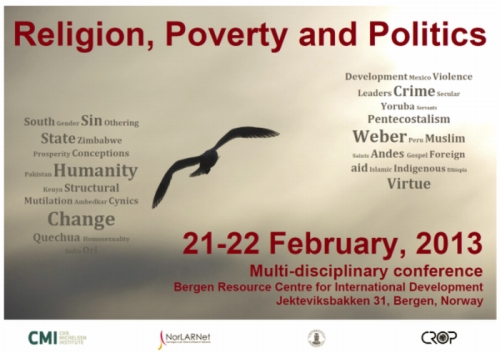Religion, Poverty and Politics

CONFERENCE organised by CROP and Chr. Michelsen Institute (CMI) to explore ways in which poverty and social injustice are addressed by different religious actors and communities.
While poverty and social injustice are glaring social facts in many societies, they are often conceptualized differently by different religious strands. The ways in which poverty and social injustice are understood may reveal not only fundamental differences from secular approaches and between different religious interpretations, but also qualitatively different ways in which poverty is addressed. The question of poverty and social injustice may e.g. involve withdrawal and isolation, non-action, or action against poverty through spiritual, ritual, organizational and/or political means.
With an emphasis on how poverty and social injustice are understood, e.g. as caused by human, material or spiritual conditions, the focus of this conference are questions of interpretation, practice and change rather than discourses on economic growth, democracy and development. Of particular interest are the various forms and dynamics of convergence between the religious and the political, e.g. from the point of departure of Catholic, Pentecostal and/or Muslim religious communities and movements, as well as indigenous worldviews and cosmologies. A central concern is how mobilization among religious actors may, e.g. on the basis of relational ontologies, generate new ways of conducting politics. By breaking with established dualisms between what has conventionally been perceived as the secular and the religious, such mobilization may imply a shift of what it means to be a political actor.
The workshop will feature papers addressing these issues, as well as one or more of the questions below:
- How do religious actors, institutions and/or organizations interpret and conceptualize poverty?
- How is poverty addressed by religious actors, institutions and/or organizations?
- In what ways does religion impede or facilitate social, cultural, institutional and/or structural change in societies where poverty is a severe problem?
- What characterize the societal models formulated by religious institutions/organizations, and how do they envisage these models and their own roles in the political, juridical and economic spheres of society?
-
To what extent do religious actors, institutions and/or organizations engage in advocacy vis-à-vis secular authorities with regard to poverty-reduction policies and practices?
Download program for Religion, Poverty and Politics workshop







